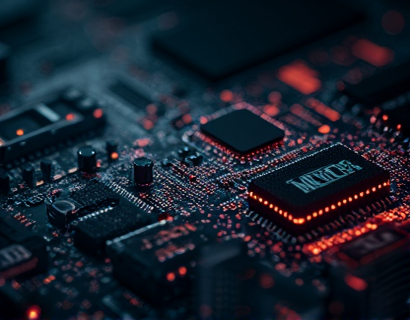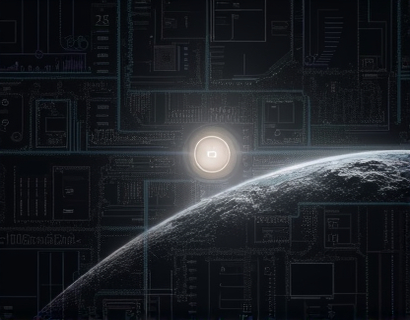Decentralized Innovation: Empowering Global Blockchain Ecosystems Through Comprehensive Collaboration Platforms
In the rapidly evolving landscape of blockchain technology, the need for robust and scalable solutions that foster collaboration and innovation has become paramount. This article delves into the concept of decentralized innovation, focusing on how comprehensive collaboration platforms can transform decentralized networks. By enhancing cooperation, resource sharing, and governance, these platforms play a crucial role in driving global efficiency and scalability for blockchain enthusiasts and innovators.
The foundation of any successful blockchain ecosystem lies in its ability to facilitate seamless interaction among its participants. Traditional centralized models often face bottlenecks and limitations, hindering the full potential of blockchain technology. Decentralized innovation addresses these challenges by creating environments where users can collaborate without intermediaries, thereby unlocking new possibilities for growth and development.
Understanding Decentralized Collaboration Platforms
Decentralized collaboration platforms are designed to bring together developers, businesses, and individuals with a shared interest in blockchain technology. These platforms provide a space for knowledge exchange, joint project development, and collective problem-solving. By leveraging the power of decentralization, these platforms ensure that no single entity controls the network, promoting fairness and transparency.
One of the key features of these platforms is their ability to support smart contracts, which are self-executing contracts with the terms directly written into code. Smart contracts automate and enforce agreements, reducing the need for intermediaries and minimizing the risk of fraud. This automation not only speeds up processes but also enhances trust among participants.
Enhancing Innovation Through Collaboration
Innovation in the blockchain space is often driven by collaborative efforts. Comprehensive collaboration platforms enable developers to build upon each other's work, creating a rich ecosystem of interconnected projects. This synergy accelerates the development of new applications and solutions, fostering a culture of continuous improvement and creativity.
For instance, open-source projects on these platforms allow developers to contribute code, report bugs, and suggest enhancements. This collective approach not only improves the quality of the software but also builds a community of experts who can tackle complex challenges. By breaking down silos and encouraging cross-pollination of ideas, these platforms significantly enhance the pace of innovation.
Improving Governance in Decentralized Networks
Effective governance is crucial for the sustainability and success of decentralized networks. Traditional governance models often suffer from centralization, leading to decision-making bottlenecks and a lack of accountability. Comprehensive collaboration platforms introduce decentralized governance mechanisms that empower the community to participate in key decisions.
These mechanisms typically involve token-based voting systems, where participants with a stake in the network can propose and vote on proposals. This approach ensures that decisions reflect the collective will of the community, promoting fairness and inclusivity. Decentralized governance also enhances transparency, as all proposals and voting results are recorded on the blockchain, accessible to anyone.
Driving Global Efficiency and Scalability
The global blockchain community faces numerous challenges, including interoperability, scalability, and user adoption. Comprehensive collaboration platforms address these issues by providing standardized frameworks and tools that facilitate seamless integration and communication between different blockchain networks.
Interoperability is a critical aspect of scaling blockchain ecosystems. By enabling different blockchains to interact and share data, these platforms break down barriers and create a more cohesive global network. This interoperability not only enhances the functionality of individual projects but also attracts more users and developers, further driving growth.
Scalability is another major concern for blockchain networks. As the number of transactions increases, traditional blockchains often struggle to maintain performance. Collaboration platforms can integrate advanced solutions such as sharding, layer 2 protocols, and off-chain transactions to alleviate these issues. These technologies distribute the load and process transactions more efficiently, ensuring that the network can handle a larger volume of activity without compromising speed or security.
Case Studies and Real-World Applications
Several projects have successfully leveraged comprehensive collaboration platforms to drive innovation and improve governance. One notable example is a decentralized finance (DeFi) platform that utilized a collaboration platform to develop a suite of financial tools. By bringing together developers, economists, and users, the project was able to create a robust and user-friendly ecosystem that gained significant traction in the market.
Another example is a supply chain management solution that used a collaboration platform to integrate multiple blockchain networks. This integration allowed for real-time tracking and verification of goods, enhancing transparency and reducing fraud. The decentralized governance model ensured that all stakeholders had a voice in the development and improvement of the system, leading to a more resilient and adaptive solution.
Challenges and Future Directions
While comprehensive collaboration platforms offer numerous benefits, they also face several challenges. One major hurdle is the technical complexity involved in building and maintaining these platforms. Developers need a deep understanding of blockchain technology and decentralized systems to create effective solutions. Additionally, ensuring the security and privacy of user data remains a critical concern.
To overcome these challenges, the community must continue to invest in education and resources, providing tools and documentation to help developers navigate the complexities of decentralized platforms. Standardization efforts can also play a vital role in promoting interoperability and reducing fragmentation within the ecosystem.
Looking ahead, the future of decentralized collaboration platforms is promising. As more organizations recognize the value of decentralized innovation, we can expect to see increased adoption and further advancements in technology. The integration of artificial intelligence, machine learning, and other emerging technologies will likely enhance the capabilities of these platforms, making them even more powerful tools for the blockchain community.
In conclusion, comprehensive collaboration platforms are revolutionizing the way decentralized networks operate. By fostering collaboration, enhancing governance, and driving efficiency and scalability, these platforms are essential for the growth and success of blockchain ecosystems. As the global community continues to embrace decentralized innovation, the potential for transformative change is immense.











































